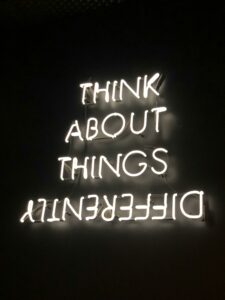Thinking About Transformation
 “Education – the knowledge and development resulting from the process of being educated.”
“Education – the knowledge and development resulting from the process of being educated.”
“Transform – a: to change in composition or structure b: to change the outward form or appearance of c: to change in character or condition.”
“Transaction: something transacted especially: an exchange or transfer of goods, services, or funds.” (All definitions from Merriam-Webster Online.)
As most of you know, I spent much of my early career working in student conduct and all of my career as a senior leader with student conduct as part of my area of responsibility at one level or another. It’s one of those jobs that many people don’t understand and think they wouldn’t ever want to do. But I, along with many colleagues, think otherwise. We know that, done well, conduct work is part of the educational experience for many college students. It’s part of helping students grow and develop, in other words participating in the students’ transformational process.
Or at least it should be. Recently a colleague told me of a conduct staff who worked remotely many days handling conduct conversations over Zoom. The staff thought it was great, saying many students preferred it. My immediate thought was, of course they do. It’s much more uncomfortable to sit in a room with someone as, together, you walk through the ways in which you made mistakes, took short cuts, and just in general, goofed up.
Now, I fully admit I don’t know all the details of the way these conversations are handled, but based on the way it was briefly described to me, it felt very transactional. A quick and simple way to handle an administrative process that, apparently, is no different than getting a copy of your transcript from the Registrar. If that description is accurate, then I have to admit I wouldn’t want that job either. The challenge of the conduct job is to find a way to help students understand the decisions they made that led to the action that got them into trouble. Then, in the best outcome understand the purpose of the sanction (consequence) for that action and choose differently the next time they are in a similar situation. That’s learning. That’s transformation.
For many students, the entire experience of college is a form of transaction. X number of hours completed = degree. So I take those hours and you give me a degree. And then, of course, that degree is supposed to be the ticket to a good job. And that works on some levels, but like a purely transactional conduct meeting, it’s a wasted opportunity.
College is certainly not the only place for personal transformation to happen. For all of us finding ways to think more deeply about our experiences, to question what we read and what we are told, and to engage with difficult questions is something we can do anytime. For most of us who have had the opportunity to go to college, it’s certainly one of the most concentrated times for this work. And those challenges come inside and outside the classroom. Later in life, we often have to seek out such opportunities or at least remember to ask the questions, challenge the assumptions, etc., as we face the day-to-day experiences of life. One of the ways we can continue to grow throughout life is work to choose between transactional and transformational interactions.
Where do you find opportunities to learn and grow in your daily life? When do you ask the questions that might turn hum-drum into amazing? When do you settle for transactional when you might choose transformational? Here’s hoping we all find ways to think about things differently.
Take care,
Gage
“Asking the proper questions is the central action of transformation. Questions are the key that causes the secret doors of the psyche to swing open.”
Clarissa Pinkola Estés
